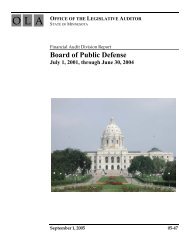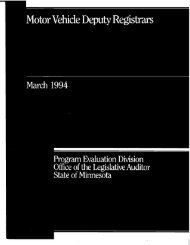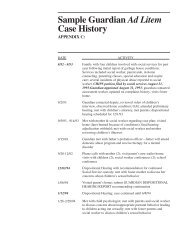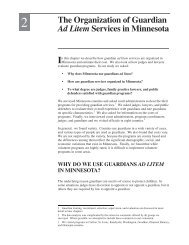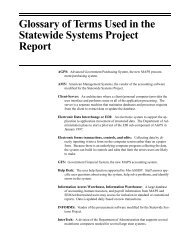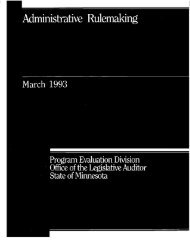Occupational Regulation - Office of the Legislative Auditor
Occupational Regulation - Office of the Legislative Auditor
Occupational Regulation - Office of the Legislative Auditor
You also want an ePaper? Increase the reach of your titles
YUMPU automatically turns print PDFs into web optimized ePapers that Google loves.
6 OCCUPATIONAL REGULATION<br />
Most requests<br />
for regulation<br />
come from<br />
occupational<br />
associations,<br />
not consumer<br />
groups.<br />
Additionally, AARP noted that because <strong>of</strong> <strong>the</strong> associated price increases<br />
occupational regulation can actually put <strong>the</strong> public in greater danger than if<br />
regulation were not present. For example, in a discussion <strong>of</strong> <strong>the</strong> price-effect <strong>of</strong><br />
regulating optometry AARP commented, “One <strong>of</strong> <strong>the</strong> most serious consequences<br />
<strong>of</strong> this combination <strong>of</strong> factors is that older people who need <strong>the</strong>ir vision corrected<br />
(and who should have pr<strong>of</strong>essional eye examinations to detect disease) may<br />
neglect to seek vision care at all.” 18<br />
Likewise, <strong>the</strong> FTC report cited a study by<br />
Carrol and Gaston (1981) that found a significant association between stricter<br />
mandatory entry requirements for electricians and higher numbers <strong>of</strong> accidental<br />
deaths from electrocution: <strong>the</strong> authors hypo<strong>the</strong>sized that <strong>the</strong> higher prices<br />
associated with stricter regulation pushed a greater number <strong>of</strong> consumers to<br />
attempt <strong>the</strong>ir own wiring. 19<br />
Despite this body <strong>of</strong> evidence, however, <strong>the</strong> authors <strong>of</strong><br />
<strong>the</strong> FTC report state; “we cannot conclude that <strong>the</strong> costs <strong>of</strong> licensing always<br />
exceed <strong>the</strong> benefits to consumers. In considering any licensing proposal, it is<br />
important to weigh carefully <strong>the</strong> likely costs against <strong>the</strong> prospective benefits on a<br />
case by case basis.” 20<br />
An indication that occupational regulation can protect pr<strong>of</strong>essionals is that most<br />
requests for occupational regulation originate with pr<strong>of</strong>essional groups and<br />
associations, ra<strong>the</strong>r than citizens’ organizations or consumer groups. This is not to<br />
suggest that such requests are strictly motivated by <strong>the</strong> desire to reduce<br />
pr<strong>of</strong>essional competition. <strong>Occupational</strong> groups are motivated to attain<br />
state-sanctioned regulation for a variety <strong>of</strong> reasons. Many pr<strong>of</strong>essional<br />
associations are concerned with maintaining high standards <strong>of</strong> quality and<br />
screening out <strong>the</strong> individuals who can give <strong>the</strong> pr<strong>of</strong>ession bad publicity.<br />
According to <strong>the</strong> Commerce Department an important factor behind some<br />
requests for state licensure is <strong>the</strong> desire to pre-empt local regulatory requirements<br />
which <strong>of</strong>ten vary from city to city. In <strong>the</strong> health care pr<strong>of</strong>essions ano<strong>the</strong>r concern<br />
is <strong>the</strong> eligibility for third-party reimbursement that <strong>of</strong>ten accompanies licensure.<br />
However, despite <strong>the</strong> altruism <strong>of</strong> various pr<strong>of</strong>essional groups, <strong>the</strong>y would not<br />
likely seek regulation if it were purely a public interest that did not <strong>of</strong>fer <strong>the</strong><br />
benefits <strong>of</strong> pr<strong>of</strong>essional protection to <strong>the</strong>ir occupation.<br />
There are several additional criticisms <strong>of</strong> occupational regulation. Critics <strong>of</strong>ten<br />
contend that occupational regulation can easily be controlled by <strong>the</strong> pr<strong>of</strong>essionals<br />
being regulated. Indeed, occupations are <strong>of</strong>ten regulated by boards dominated by<br />
members <strong>of</strong> <strong>the</strong> regulated pr<strong>of</strong>ession, whose appointments are <strong>of</strong>ten based on<br />
recommendations <strong>of</strong> pr<strong>of</strong>essional associations. Critics suggest that this<br />
arrangement limits protection <strong>of</strong> <strong>the</strong> public when it comes in conflict with <strong>the</strong><br />
protection <strong>of</strong> pr<strong>of</strong>essionals.<br />
Ano<strong>the</strong>r criticism has to do with complaint processing and <strong>the</strong> enforcement <strong>of</strong><br />
disciplinary actions. Many regulatory boards have been accused <strong>of</strong> failing to<br />
adequately investigate complaints and discipline practitioners. Here again boards<br />
18 AARP, Unreasonable <strong>Regulation</strong> = Unreasonable Prices, 16.<br />
19 Cox and Foster, The Costs and Benefits <strong>of</strong> <strong>Occupational</strong> <strong>Regulation</strong>, 29 (S. Carrol and R.<br />
Gaston, “<strong>Occupational</strong> Restrictions and <strong>the</strong> Quality <strong>of</strong> Service Received: Some Evidence,” Sou<strong>the</strong>rn<br />
Economic Journal, 47, no. 4 (1981)).<br />
20 Cox and Foster, The Costs and Benefits <strong>of</strong> <strong>Occupational</strong> <strong>Regulation</strong>, v.



